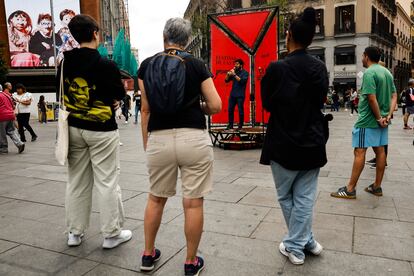Madrid has become filled with preachers. They are not religious, but philosophical, and they lurk on many corners, ready to share conversation and broaden minds. As in Ancient Greece, as in Victorian London, the city has sprouted speaker’s corners (speaker’s corners) in a handful of streets in the centre. “I think it’s fantastic that these issues are being discussed so openly,” says Juana, a 20-year-old university student, as she watched journalist Marta García Aller talk about artificial intelligence on a small stage on Calle Montera at 11:30 a.m. on Thursday. The conversation is open and passers-by, although initially surprised, join in and end up giving their point of view. Not far from there, in Plaza del Callao, writers Juan Tallón and Renato Cisneros were talking at the same time about the individual and collective fears that grip our world, in a talk that sought “catharsis and liberation through the shared experience of facing and understanding fear,” said Tallón.
This is the first edition of the Festival of Ideas, which for four days (until 21 September) takes to the streets of the capital with the aim of spreading critical thinking through a dozen venues (the Reina Sofía Museum, the Teatro Real, the Ateneo, Plaza de España, the Círculo de Bellas Artes…) open to the public and in which thinkers and writers of the stature of Michael Sandel, Gilles Lipovetsky, Wendy Brown, Peter Sloterdijk, Marina Garcés and Javier Gomá will discuss the most pressing issues of today (and history).
At the same time that García Aller was speaking in the street, Josefa Ros Velasco, winner of the National Research Award, was speaking about boredom at the Círculo de Bellas Artes in front of a packed auditorium. She was talking about how our society is “sick with boredom”, the possibilities that boredom offers and the two most bored groups: children and the elderly. The elderly, of course, who seek “to be active in their life project, to give continuity to their biography, not to make necklaces with macaroni”. Ros Velasco spoke just after the experts in new technologies Margot Rot, Xavier Casanovas and Susana Martín Faúndez discussed the use (and abuse) of these technologies, their regulation and “the possible rules of behaviour that we should all follow”.
At the same time, at the Reina Sofía Museum, the artist Marina Núñez was taking a stroll with a group of curious people, with whom she discussed “contemporary art and its relationship with politics and emotion.” The events on Thursday morning are just a few of the dozens and dozens of talks planned, free of charge until full capacity is reached. The afternoon storms have forced some activities to be moved to the Círculo de Bellas Artes.
“This festival was born to promote the origin of thought, and to share it. Anyone who wants to participate is welcome,” said journalist Lara Siscar at the presentation on Wednesday on a huge stage in Plaza de España, who opened the festival in front of 600 seats. All occupied. Siscar outlined the core of this first edition: “We will occupy the streets, the squares, as in Ancient Greece.” There will be four days of thought for anyone who wants to offer it, all around philosophical walks, talks and speaker points; a festival conceived by “an exceptional man,” as Siscar said, before applause broke out for Alberto Anaut, president and director of the cultural company La Fábrica, who died in July 2023.
Siscar was accompanied by Valerio Rocco, director of the Círculo de Bellas Artes, and Óscar Becerra, director of La Fábrica, organizers of the event, who explained how the festival and its 11 venues would work. “Heraclitus said that we all tell the truth,” Rocco recalled. And that is what they are doing, making Madrid “think,” in the words of Becerra. “Today we believe that arguing is prevailing. Hopefully it will help us to see the shades of those who do not think like us,” said Javier Moscoso, director of content for the festival, accompanied by Gonzalo Cabrera, General Director of Culture and Creative Industries of the Community of Madrid.
Some of the event’s sponsors also appeared at Wednesday’s event, such as Olivia Loewe, from Allianz (“this is a perfect platform for the diversity of ideas, to understand the value of those who do not think like us”), and Sonia Mulero, from the Banco Sabadell Foundation (“these are days to work with words, which are so important for shaping the world and reality”).
Marta Rivera de la Cruz, the Culture Delegate of the Madrid City Council, said: “Madrid is a city of streets. You can have a beer and watch a concert, but you also have to defend reflection and thought. That will make us freer and better.” The event was also attended by Eric Tallon, cultural adviser of the French Embassy, and Fabian Krajewski, spokesperson for the German Embassy; both embassies collaborate with the festival, which also organizes a “night of Franco-German thought.” The post-event talk, led by Eva Illouz, a Franco-Israeli sociologist, was interrupted by a small group of pro-Palestine activists. On the bright side, it was the first street confrontation of ideas of the festival.
Just before, the event on Wednesday was closed by Jordi Martí Grau, Secretary of State for Culture, who spoke about one of the words that will be most heard in the streets of Madrid these days: “catharsis”. “In the contemporary world, complaints are logical, and the idea that the future no longer exists is growing. But complaints must be an activation; culture is the toolbox with which we must act,” he said, before calling for the creation of “a festival that is not only celebratory, but that serves to find the best ideas, and to apply them.” “Let’s hunt for useful ideas!” he urged. Let’s hunt. Let’s not leave a single idea loose in the streets.

